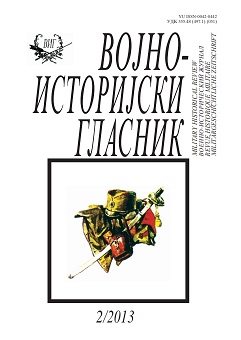Настанак и развој војне литературе у Србији 1850–1912. године
Creation and Development of Military Literature in Serbia 1850-1912
Author(s): Slobodan ĐukićSubject(s): Military history, Political history, Military policy, 19th Century, Pre-WW I & WW I (1900 -1919)
Published by: Institut za strategijska istraživanja
Keywords: Military literature; Vojin; warrior; official military gazette; Serbian Guard; Serbian army; army; Jovan Dragasevic; Jovan Miskovic;
Summary/Abstract: It is wrong to assess influence of certain foreign military literature on Serbian one merely by number of translated titles. In this particular case statistics can lead us on wrong conclusions. Success on the battlefield, new thoughts in arts of war, and new technical solutions used to have greatest response and influence on development of military literature. Initially, Serbian military literature used to develop under strong influence of French military literature which used to be considered as best one all away from the times of Napoleon Bonaparte. In military terms, unified and enlarged Germany after victory over France 1870/71 became model for almost all European states. Serbia was no exception either. German influence on Serbian military literature during 70’s and 80’ of the 19th century was strong and dominant. Instructed by its own experience Serbian officers corpse begins to search for models in literature of other European countries. Real stimulus represented political changes after the abdication of King Milan in 1889. In addition, new subject, Russian language was introduced in curriculum at Military academy in 1890. In town of Niš, new society for learning of Russian language and literature named as “Russian circle” has been established. So, by the end of 19th century number of titles from French and Russian military literature equaled with those in German. To a certain extent Serbian authors can be denied originality while they could be characterized as compilers; however it does not diminishes their importance. By using foreign military literature Serbian offices kept pace with ideas and ruling doctrines in developed European armed forces. If we take in mind total number of Serbian officers, size of the army and its equipment, overall situation looked logical. Because principal issues and truths from the military domain were mostly refined and elaborated, originality came from skillful implementation of already known and determined principles on circumstances which ruled in Serbian army.
Journal: Vojnoistorijski glasnik
- Issue Year: 2013
- Issue No: 2
- Page Range: 41-68
- Page Count: 28
- Language: Serbian

